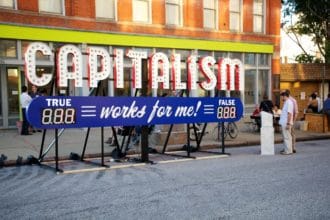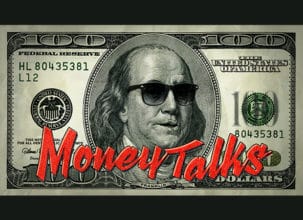“Do you have en emergency number you would like us to call? It saves you the expensive ambulance ride to the hospital in case something goes wrong during class. And welcome to your new yoga school!” “Happy to be here”, I reply, aware of the appropriate response. Yet inside I smile and warily shake my head: nothing reminds you of being in America like a casual remark about capitalism.
I remember the first time I noticed a remark like that. It was was on a memorable nocturnal Greyhound ride from Montreal to New York City, about a decade ago. Around 2 am a woman with six kids entered. With a toddler on her arms and a bunch of kids and bags in her wake she reached the back of the bus. A big man, vastly asleep occupied her seat. There was plenty of room in the bus but she wanted that particular one. Half awake he asked her to pick any other spot –easier for everyone. Bad move. Things got ugly quickly.
What started as a screaming standoff escalated into a full-blown showcase of a certain America: swearing, racial accusations, a scuffle and KFC-buckets flying around (thanks to a previous pit stop the bus smelled like fried chicken all the way to the Big Apple). The bus driver pulled over and called in the police. Unloaded we drove of to our final destination, hours delayed. What stuck with me more than anything was the argument the woman loudly screamed out over and over again: “I PAID FOR IT, I HAVE A RIGHT TO THIS SEAT.”

It may not seem like a world shocking remark but that simple sentence defines everyday interactions – big or small – in this country: if I pay for it, I have a right to it– whatever it may be. It’s the argument that makes all others disappear. Casual remarks about money and what having it or lacking it means keep sneaking up in everyday situations. When taking a bus ride, in random conversations with strangers, or taking a class in a California hippie yoga school. ‘Clasp your hand like you’re holding a 100 dollar bill’ is most certainly the most out of context instruction I have ever had in a yoga class. Namaste.
Ever since I moved to America, money is top of mind and not just because journalism pays shit and California is ridiculously expensive. Money is part of life and everyday conversations almost like the weather is in the Netherlands. Friends – rich and poor – all talk about their side hustles; their projects on the side to safe for a rainy day they are pretty sure will come one day.
It’s not just money in politics or income inequality, or Piketty’s Capital that expose capitalism’s meaning in society. It’s the remarks that keep on sneaking up in everyday rituals and habits. It’s the casual expressions that slip into a conversation, the friendly joke the bartender makes while pouring you a drink, the date that starts a conversation saying: I know I am a good catch, I am good for at least 300 grand a year (it was a very short date). I keep a list of these remarks. It grows steadily. And every time it does I smile on the inside, warily shake my head and answer the only way appropriate: “Happy to be here!”
Laila Frank is a freelance journalist specialized in America, campaigns and politics. She is fascinated by humanity’s (in)ability to (co)exist; her writing feeds off that fascination. She was trained as a political strategist and campaign manager and worked behind the scenes in politics for over 12 years before becoming a journalist. These months she is traveling California, looking for stories.

